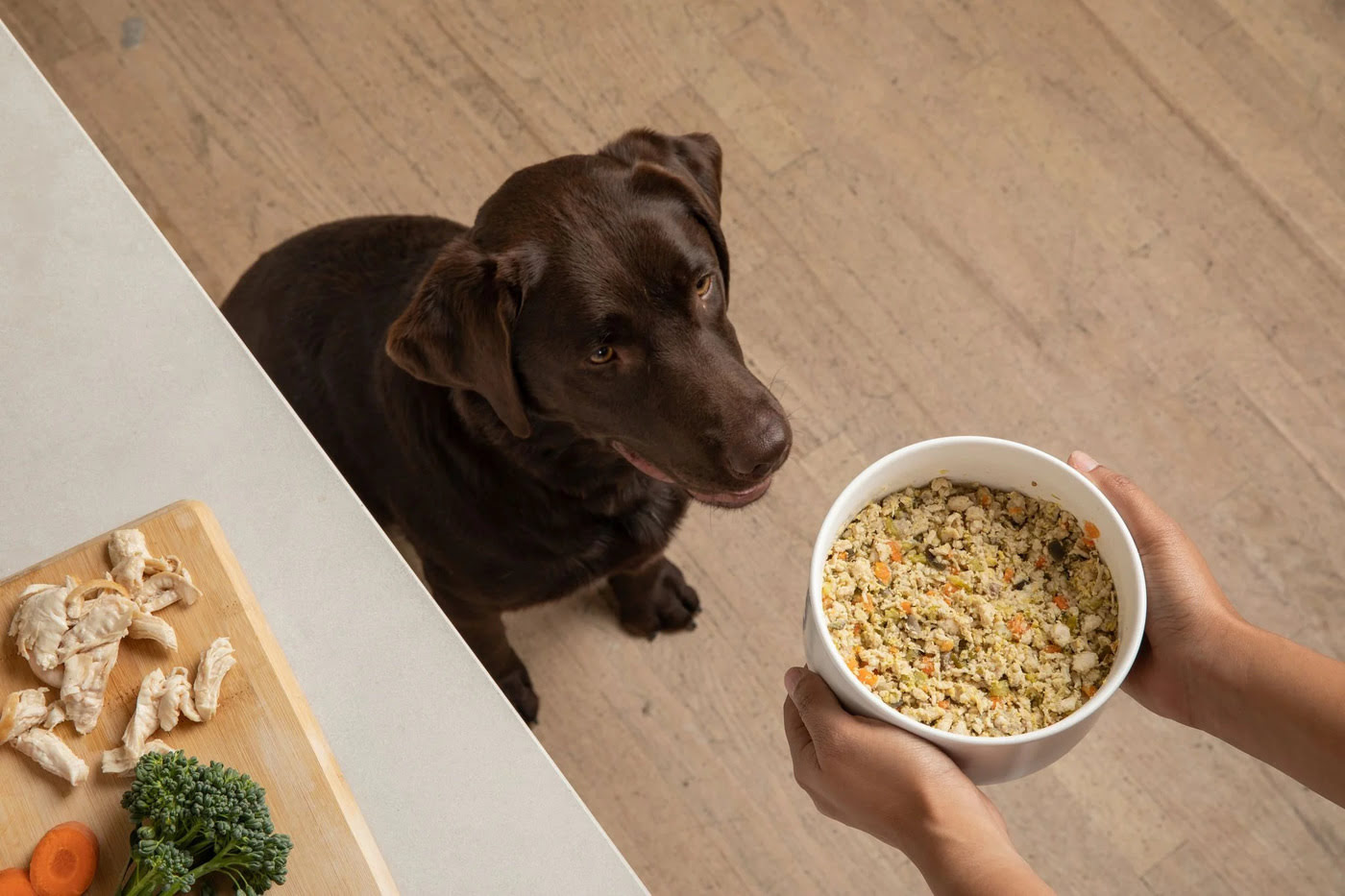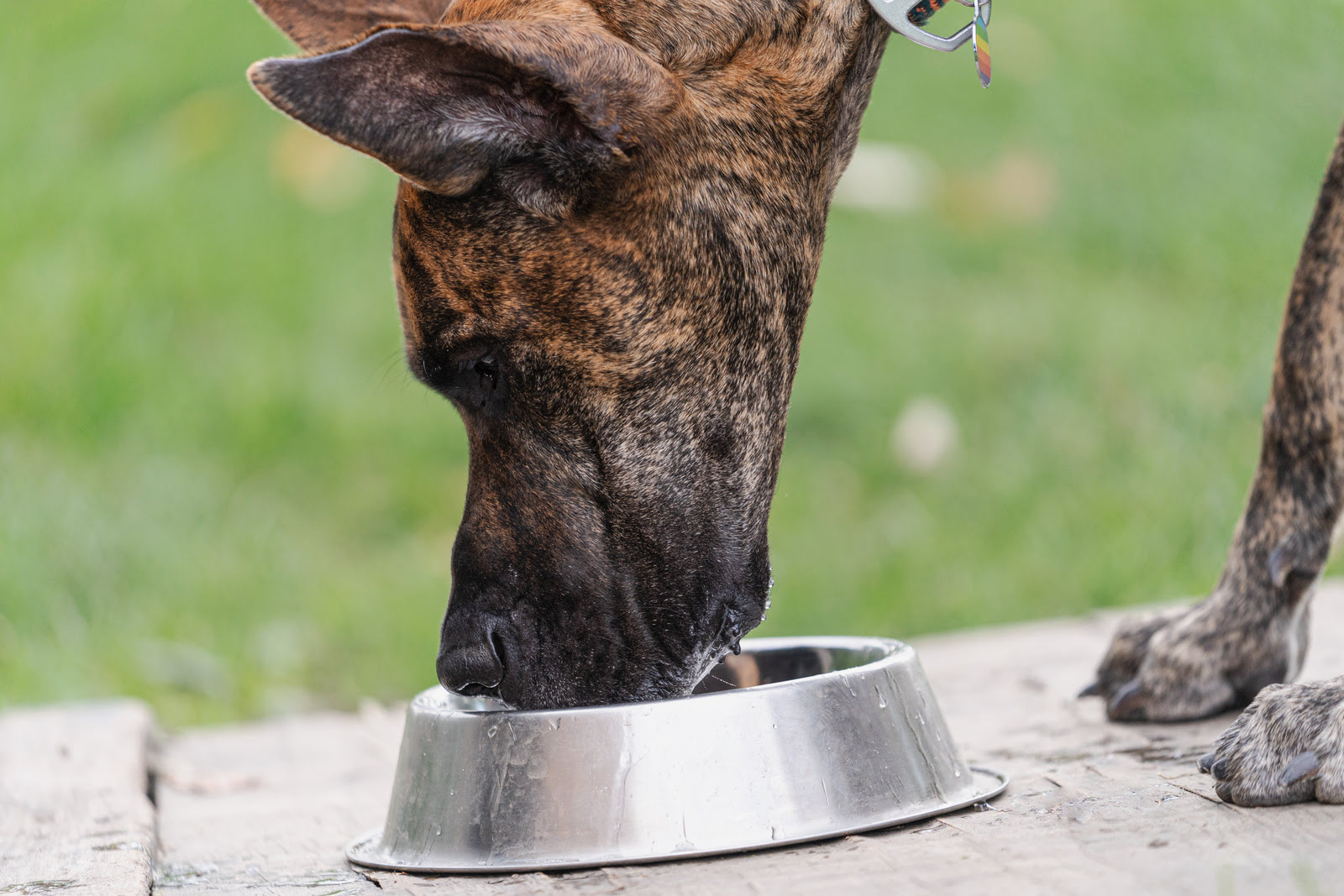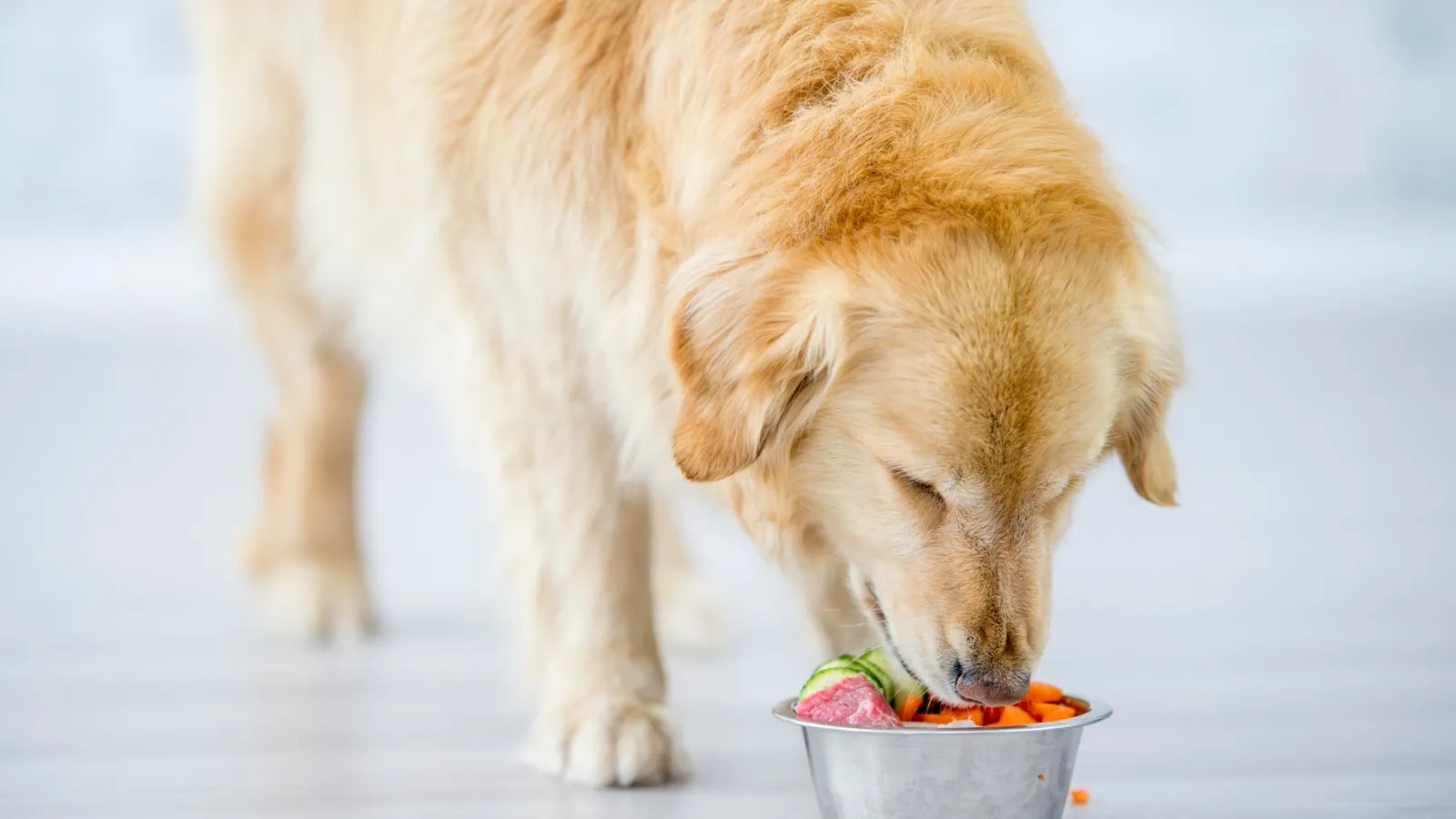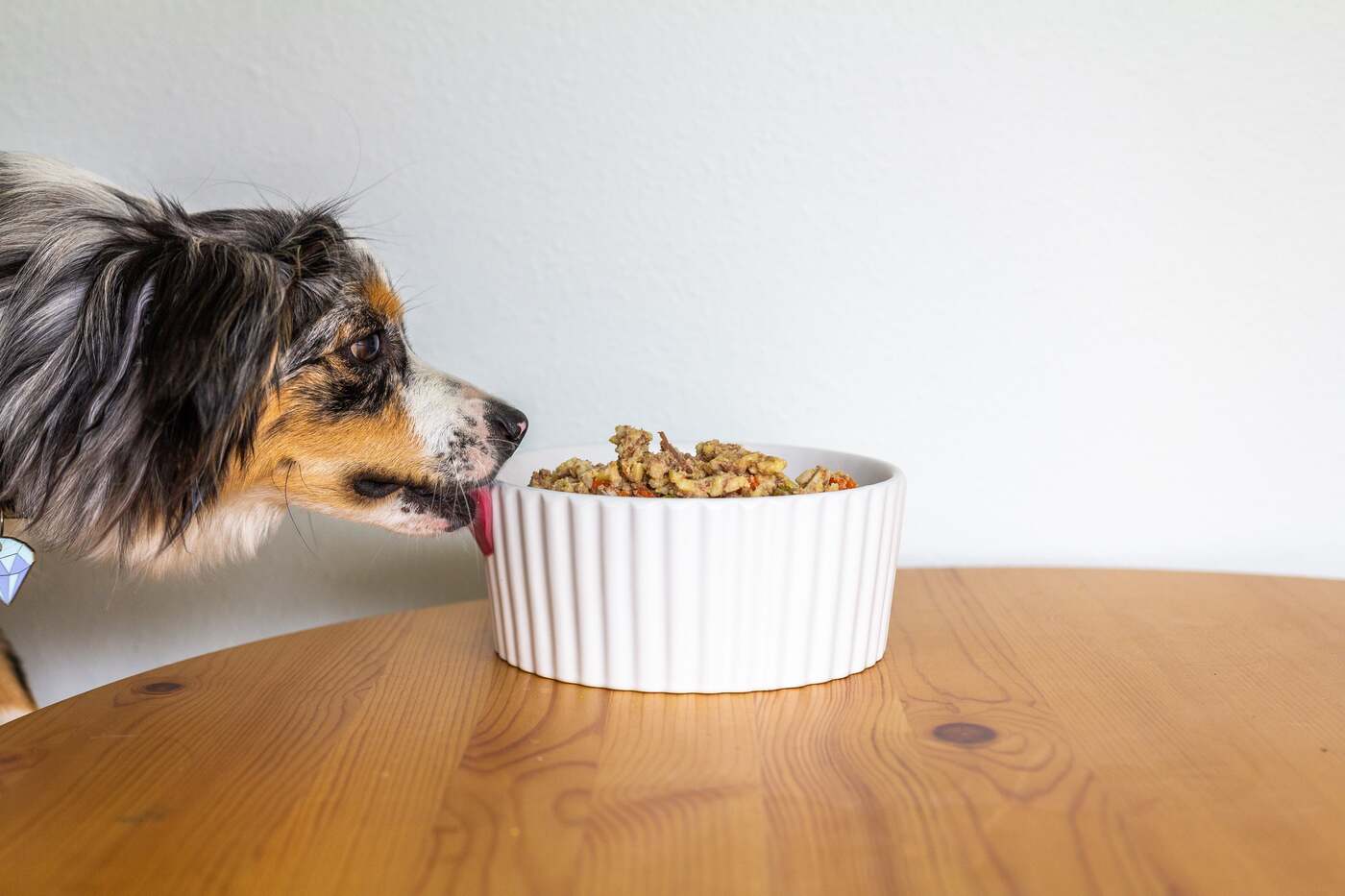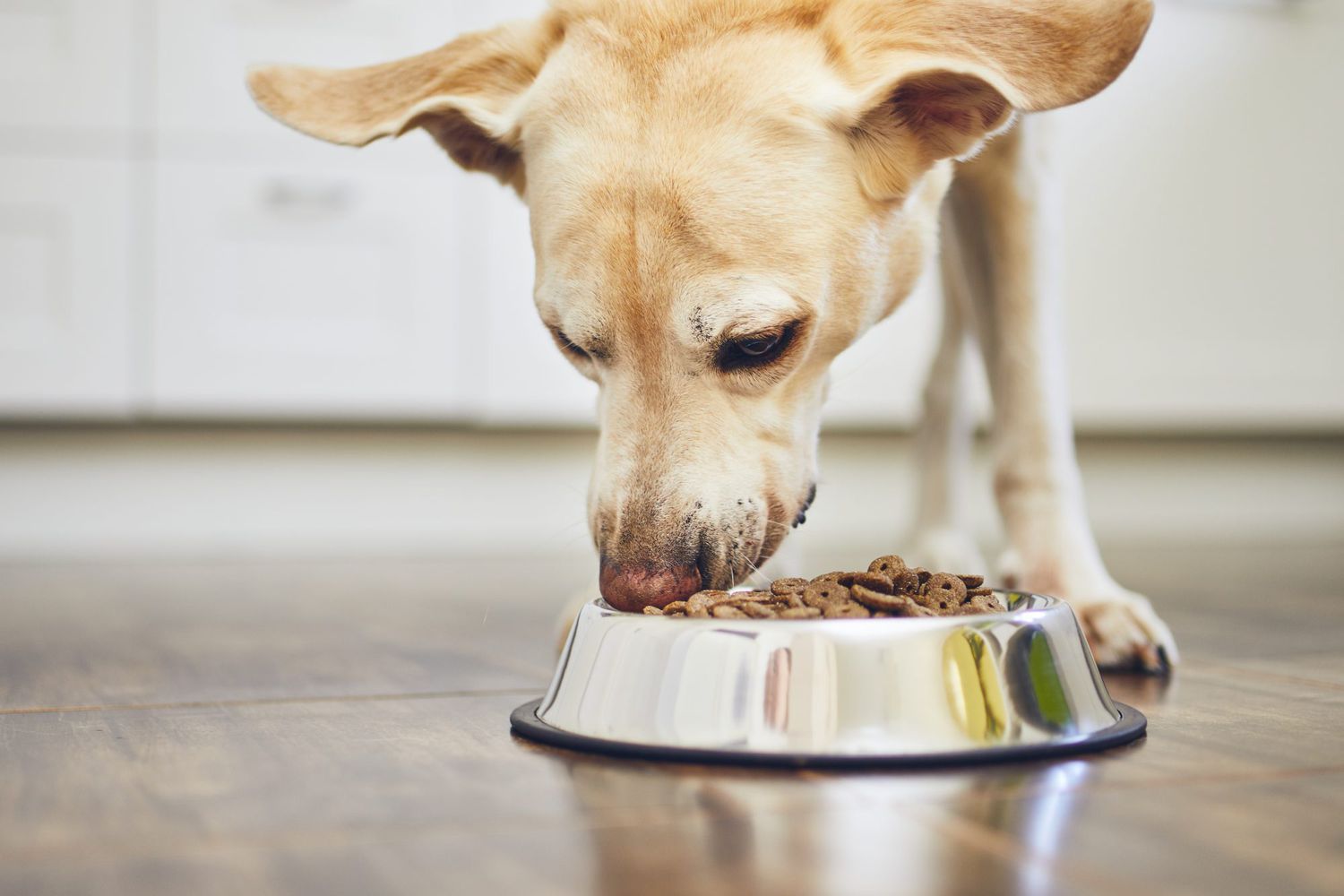Home>Health & Wellness>Nutrition & Diet>What To Feed Dogs With IBD For Fiber In Their Diet
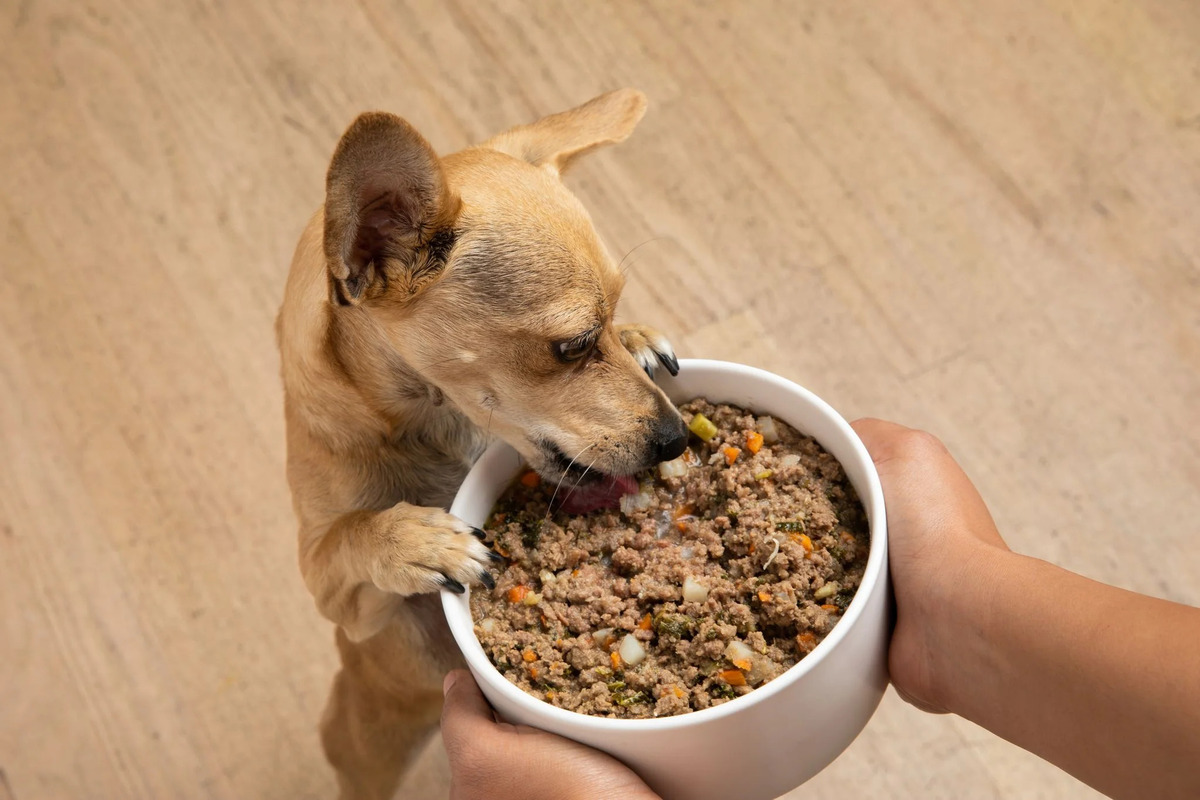

Nutrition & Diet
What To Feed Dogs With IBD For Fiber In Their Diet
Published: January 28, 2024
Discover the best high-fiber diet options for dogs with IBD. Learn how to optimize their nutrition and diet for improved digestive health.
(Many of the links in this article redirect to a specific reviewed product. Your purchase of these products through affiliate links helps to generate commission for Pawsomeoldies.com, at no extra cost. Learn more)
Table of Contents
Introduction
Inflammatory Bowel Disease (IBD) is a challenging condition that can affect our beloved canine companions. It's a chronic gastrointestinal disorder that involves inflammation of the digestive tract, leading to discomfort, digestive issues, and overall reduced quality of life for dogs. As pet owners, it's crucial to understand the dietary needs of dogs with IBD to help manage their condition effectively.
Diet plays a pivotal role in the management of IBD in dogs. By providing the right nutrients and ensuring a balanced intake of essential dietary components, pet owners can significantly alleviate the symptoms and support their furry friends' overall well-being. One crucial aspect of a dog's diet that warrants attention in the context of IBD is fiber.
Fiber is an indispensable component of a dog's diet, and its significance becomes even more pronounced when dealing with IBD. It serves as a vital aid in promoting healthy digestion and can help alleviate gastrointestinal distress in dogs with IBD. Understanding the role of fiber and making informed dietary choices can make a substantial difference in managing IBD and enhancing the comfort and health of our canine companions.
In the subsequent sections, we will delve deeper into the intricacies of IBD in dogs, the importance of fiber in their diet, suitable high-fiber foods, foods to avoid, and practical tips for incorporating fiber into a dog's diet. By gaining a comprehensive understanding of these aspects, pet owners can empower themselves to make informed decisions and provide the best possible care for their furry friends dealing with IBD.
Read more: How To Incorporate Fiber Into A Dog’s Diet
Understanding Inflammatory Bowel Disease (IBD) in Dogs
Inflammatory Bowel Disease (IBD) is a complex and challenging condition that can significantly impact the health and well-being of dogs. This chronic gastrointestinal disorder involves inflammation of the digestive tract, encompassing the stomach, small intestine, and large intestine. The precise cause of IBD in dogs remains elusive, but it is believed to stem from a combination of genetic predisposition, immune system abnormalities, and environmental factors.
Dogs affected by IBD often experience a range of distressing symptoms, including chronic diarrhea, vomiting, weight loss, decreased appetite, and lethargy. The inflammation within the gastrointestinal tract can lead to discomfort, pain, and compromised nutrient absorption, ultimately affecting the dog's overall health and quality of life.
IBD in dogs is typically diagnosed through a comprehensive evaluation, which may include blood tests, fecal examinations, imaging studies, and in some cases, endoscopy with biopsies. This thorough assessment is crucial for accurate diagnosis and to rule out other potential underlying conditions with similar symptoms.
Once diagnosed, the management of IBD in dogs often involves a multifaceted approach, encompassing dietary modifications, medication, and close monitoring by a veterinarian. Dietary management plays a pivotal role in alleviating the symptoms and supporting the overall health of dogs with IBD. It is essential to provide a diet that is easily digestible, nutrient-rich, and gentle on the gastrointestinal system.
Furthermore, the impact of IBD extends beyond the physical symptoms, as it can also affect the emotional well-being of dogs. The discomfort and distress caused by IBD can lead to anxiety and behavioral changes in affected dogs. Therefore, a holistic approach to managing IBD is essential, encompassing not only the physical aspects but also the emotional and psychological needs of the canine companions.
Understanding the intricacies of IBD in dogs is crucial for pet owners, as it enables them to make informed decisions regarding their furry friends' care. By gaining insight into the nature of this condition, pet owners can actively participate in the management process, collaborate effectively with veterinarians, and provide the necessary support and comfort to their dogs as they navigate through the challenges posed by IBD.
Importance of Fiber in a Dog's Diet with IBD
Fiber plays a pivotal role in the diet of dogs dealing with Inflammatory Bowel Disease (IBD). This indigestible component derived from plant-based sources offers a myriad of benefits that are particularly valuable in managing the symptoms of IBD in dogs.
Digestive Health Support
Fiber acts as a natural regulator of the digestive system, promoting optimal bowel function and regularity. In the context of IBD, where gastrointestinal distress is prevalent, the inclusion of fiber in a dog's diet can help alleviate constipation or diarrhea, both of which are common symptoms of the condition. By promoting healthy bowel movements, fiber contributes to the overall comfort and well-being of dogs with IBD.
Enhanced Nutrient Absorption
Incorporating fiber-rich foods into a dog's diet can aid in optimizing nutrient absorption. IBD can compromise the digestive tract's ability to absorb essential nutrients, leading to deficiencies and further health complications. Fiber plays a supportive role in this aspect by facilitating the absorption of vital nutrients, thereby bolstering the dog's overall nutritional status.
Read more: How Much To Feed A Dog On A Diet
Weight Management
Weight management is a crucial consideration in the care of dogs with IBD. Fluctuations in weight, whether due to loss or gain, can exacerbate the challenges posed by IBD. Fiber contributes to a sense of satiety, promoting a feeling of fullness and potentially aiding in weight management. This is particularly beneficial in cases where dogs with IBD may have decreased appetites or irregular eating patterns.
Anti-Inflammatory Properties
Certain types of fiber possess anti-inflammatory properties, which can be advantageous in managing the inflammation associated with IBD. By incorporating fiber with anti-inflammatory properties into a dog's diet, pet owners can potentially mitigate the severity of gastrointestinal inflammation, providing relief to their furry companions.
Overall Gastrointestinal Well-being
The inclusion of fiber in a dog's diet contributes to the maintenance of a healthy gastrointestinal environment. It can aid in balancing the gut microbiota, promoting the growth of beneficial bacteria, and fostering a harmonious digestive ecosystem. This is particularly valuable in the context of IBD, where the delicate balance of the gastrointestinal flora may be disrupted.
In essence, the importance of fiber in a dog's diet with IBD cannot be overstated. It serves as a valuable ally in promoting digestive health, supporting nutrient absorption, managing weight, mitigating inflammation, and fostering overall gastrointestinal well-being. By recognizing the significance of fiber and making informed dietary choices, pet owners can play an active role in enhancing the comfort and quality of life of their canine companions dealing with IBD.
High-Fiber Foods for Dogs with IBD
When it comes to managing Inflammatory Bowel Disease (IBD) in dogs, incorporating high-fiber foods into their diet can be immensely beneficial. These fiber-rich options can provide essential nutrients while supporting digestive health and overall well-being. Here are some high-fiber foods that are well-suited for dogs dealing with IBD:
Read more: How To Feed My Dog A Ketogenic Diet
1. Pumpkin
Pumpkin is a highly regarded high-fiber food for dogs with IBD. It is easily digestible and contains soluble fiber, which can aid in regulating bowel movements. Additionally, the natural anti-inflammatory properties of pumpkin can help soothe the gastrointestinal tract, providing relief from the discomfort associated with IBD.
2. Sweet Potatoes
Sweet potatoes are an excellent source of dietary fiber for dogs. They are rich in soluble fiber, which supports healthy digestion and can contribute to a more stable gastrointestinal environment. Moreover, sweet potatoes provide valuable nutrients such as vitamins A and C, further enhancing their nutritional value for dogs with IBD.
3. Green Beans
Green beans are low in calories and high in fiber, making them an ideal addition to a dog's diet, especially for those with IBD. The fiber content in green beans promotes digestive regularity and can assist in managing gastrointestinal symptoms. These nutrient-dense vegetables also offer essential vitamins and minerals, contributing to a well-rounded diet for dogs.
4. Oatmeal
Oatmeal is a wholesome and fiber-rich grain that can be beneficial for dogs with IBD. It contains soluble fiber, which aids in maintaining consistent bowel function and can help alleviate digestive discomfort. Oatmeal also provides sustained energy and is gentle on the digestive system, making it a favorable option for dogs with sensitive stomachs.
5. Carrots
Carrots are not only a crunchy and enjoyable treat for dogs but also a valuable source of dietary fiber. The fiber in carrots supports gastrointestinal health and can contribute to firmer stools, addressing issues related to diarrhea or irregular bowel movements. Additionally, carrots contain essential nutrients like beta-carotene, promoting overall wellness in dogs with IBD.
Incorporating these high-fiber foods into a dog's diet can play a significant role in managing the symptoms of IBD and supporting their digestive health. It is important to introduce these foods gradually and in moderation, ensuring that they are well-tolerated by the dog's system. By making informed dietary choices and prioritizing high-fiber options, pet owners can actively contribute to the well-being of their furry companions as they navigate through the challenges posed by IBD.
Low-Fiber Foods to Avoid for Dogs with IBD
When managing Inflammatory Bowel Disease (IBD) in dogs, it is equally crucial to be mindful of the foods that are best avoided due to their low-fiber content and potential to exacerbate gastrointestinal distress. Certain low-fiber foods can be challenging for dogs with IBD to digest and may contribute to increased discomfort and digestive disturbances. Here are some low-fiber foods that should be avoided in the diet of dogs with IBD:
-
Highly Processed Foods: Foods that are heavily processed and devoid of natural fiber content should be avoided. These may include commercial treats, sugary snacks, and low-quality kibble. Such items often lack the essential dietary fiber needed to support healthy digestion and may contain additives or preservatives that can further irritate the gastrointestinal tract.
-
Fatty Meats: While lean meats can be beneficial for dogs, fatty cuts of meat should be avoided for those with IBD. High-fat foods can trigger inflammation in the digestive tract and may lead to discomfort and diarrhea in dogs with sensitive stomachs. Opting for leaner protein sources can help minimize the risk of exacerbating gastrointestinal symptoms.
-
Dairy Products: Dairy, including milk, cheese, and ice cream, is best avoided for dogs with IBD. Many dogs have difficulty digesting lactose, the sugar found in dairy products, which can result in digestive upset and diarrhea. Additionally, some dogs with IBD may have underlying sensitivities to dairy proteins, further necessitating the exclusion of dairy from their diet.
-
Highly Seasoned Foods: Foods that are heavily seasoned, spicy, or contain excessive salt should be kept away from dogs with IBD. These items can irritate the gastrointestinal lining and may lead to inflammation and discomfort. Opting for bland, minimally seasoned foods is preferable for dogs dealing with digestive sensitivities.
-
Certain Grains: While whole grains can offer valuable fiber, some refined grains and gluten-rich products may not be well-tolerated by dogs with IBD. Foods containing wheat, corn, or soy derivatives should be approached with caution, as these ingredients can potentially trigger adverse reactions in dogs with sensitive digestive systems.
By being mindful of these low-fiber foods to avoid, pet owners can take proactive measures to support the digestive health of their dogs with IBD. Making informed dietary choices and prioritizing high-quality, fiber-rich foods can significantly contribute to managing the symptoms of IBD and enhancing the overall well-being of canine companions facing this challenging condition.
Tips for Adding Fiber to a Dog's Diet
Introducing fiber into a dog's diet, especially when managing Inflammatory Bowel Disease (IBD), requires a thoughtful and gradual approach to ensure optimal digestion and nutrient absorption. Here are valuable tips for pet owners looking to incorporate fiber into their canine companion's diet:
1. Gradual Transition
When introducing new fiber-rich foods, it is essential to do so gradually. Sudden dietary changes can disrupt the dog's digestive system, leading to potential discomfort and gastrointestinal upset. Gradually incorporating high-fiber foods allows the dog's digestive system to adapt and minimizes the risk of adverse reactions.
Read more: What To Feed A Dog That Has Allergies
2. Consultation with a Veterinarian
Before making significant dietary modifications, consulting with a veterinarian is paramount. A veterinarian can provide personalized recommendations based on the dog's specific nutritional needs, health status, and the severity of IBD. This professional guidance ensures that the dietary changes align with the dog's overall well-being and medical requirements.
3. Balanced Nutrition
While focusing on adding fiber, it is crucial to maintain a balanced and complete diet for the dog. This entails ensuring that the diet encompasses essential nutrients, including proteins, fats, vitamins, and minerals, alongside the fiber-rich components. Balancing the nutritional profile of the dog's diet is vital for supporting overall health and addressing the specific dietary needs associated with IBD.
4. Monitoring Digestive Response
Observing the dog's digestive response to the newly introduced fiber sources is essential. Pet owners should monitor bowel movements, stool consistency, and any signs of gastrointestinal discomfort. This vigilant observation enables timely adjustments and ensures that the dietary changes are well-tolerated by the dog.
5. Hydration
As fiber contributes to healthy digestion, adequate hydration is crucial to support its beneficial effects. Ensuring that the dog has access to fresh, clean water at all times is essential, especially when increasing fiber intake. Proper hydration facilitates the movement of fiber through the digestive tract and helps prevent constipation, promoting overall gastrointestinal well-being.
Read more: How Do I Start Feeding My Dog A Raw Diet
6. Variety in Fiber Sources
Incorporating a variety of fiber sources into the dog's diet can offer a spectrum of nutritional benefits. Different fiber-rich foods bring distinct nutrients and properties to the table, contributing to a well-rounded diet. By diversifying the fiber sources, pet owners can provide comprehensive nutritional support while catering to the dog's preferences and tolerances.
By implementing these tips, pet owners can navigate the process of adding fiber to their dog's diet with attentiveness and care. This approach not only supports the management of IBD but also promotes the overall health and well-being of dogs, ensuring that their dietary needs are met with consideration and efficacy.
Conclusion
In conclusion, the management of Inflammatory Bowel Disease (IBD) in dogs necessitates a comprehensive understanding of the role of fiber in their diet. Fiber stands as a crucial ally in promoting digestive health, supporting nutrient absorption, and mitigating the symptoms associated with IBD. By incorporating high-fiber foods such as pumpkin, sweet potatoes, green beans, oatmeal, and carrots, pet owners can actively contribute to the well-being of their canine companions dealing with IBD.
Furthermore, being mindful of low-fiber foods to avoid, including highly processed items, fatty meats, dairy products, heavily seasoned foods, and certain grains, is essential in preventing exacerbation of gastrointestinal distress in dogs with IBD. By making informed dietary choices and prioritizing high-quality, fiber-rich foods, pet owners can significantly contribute to managing the symptoms of IBD and enhancing the overall well-being of their furry companions.
Introducing fiber into a dog's diet requires a thoughtful and gradual approach, emphasizing the importance of a balanced transition, consultation with a veterinarian, and vigilant monitoring of the dog's digestive response. By implementing these tips and ensuring adequate hydration, pet owners can navigate the process of adding fiber to their dog's diet with attentiveness and care, promoting not only the management of IBD but also the overall health and well-being of their beloved canine companions.
In essence, the significance of fiber in a dog's diet with IBD cannot be overstated. It serves as a valuable aid in promoting digestive health, supporting nutrient absorption, managing weight, mitigating inflammation, and fostering overall gastrointestinal well-being. By recognizing the importance of fiber and making informed dietary choices, pet owners can play an active role in enhancing the comfort and quality of life of their canine companions dealing with IBD.
